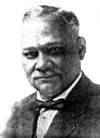Scipio Africanus Jones (August 3, 1863 – March 2, 1943) was an American educator, lawyer, judge, philanthropist, and Republican politician from the state of Arkansas. He was most known for having guided the appeals of the twelve African-American men condemned to death after the Elaine Massacre of October 1919. More than one hundred African Americans were indicted in the aftermath of the riot, although an estimated one hundred to two hundred Black Americans were killed in the county, along with five whites. No whites were prosecuted by the state. The case was appealed to the United States Supreme Court, which in Moore v. Dempsey (1923) set a precedent of reviewing the conduct of state criminal trials against the Due Process Clause of the Fourteenth Amendment to the United States Constitution.
Born into slavery in Smith Township near Tulip in Dallas County in south Arkansas, Jones became a successful and powerful businessman. Jones was the first lawyer in Arkansas to raise the question that African Americans had not been permitted to serve on grand juries and petit juries. In 1915, Jones broke a color barrier when he was appointed to serve as acting judge of the Little Rock police court, presiding over a case in which all the parties were blacks, as were the witnesses and attorneys except the city attorney, who supported having a Negro judge preside at this particular trial. Jones also represented Negro Shriners as part of a successful defense against efforts to keep them from using the name and paraphernalia of the Shriners organization. (Full article...)
